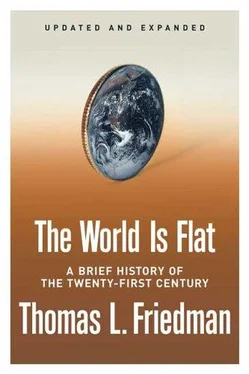When I arrived in Minneapolis, I had dinner with family friends, one of whom has spent his life working as a wholesaler in the Midwest, selling goods to the biggest retailers in the region. He is a natural salesman. When I asked him what was new, he sighed and said that business just wasn't what it used to be. Everything was now being sold at 1 percent margins, he explained. No problem. He was selling mostly commodity items so that, given his volumes, he could handle the slim profit margin. But what bothered him, he mentioned, was the fact that he no longer had human contact with some of his biggest accounts. Even commodities and low-cost goods have certain differentiating elements that need to be sold and highlighted. “Everything is by e-mail now,” he said. “I am dealing with a young kid at [one of the biggest retailers in the nation], and he says, 'Just e-mail me your bid.' I've never met him. Half the time he doesn't get back to me. I am not sure how to deal with him... In the old days, I used to stop by the office, give the buyers a few Vikings tickets. We were friends... Tommy, all anyone cares about today is price.”
Fortunately, my friend is a successful businessman and has a range of enterprises. But as I reflected later on what he was saying, I was drawn back to that scene in Death of a Salesman in which Willy Loman says that, unlike his colleague Charley, he intends to be “well liked.” He tells his sons that in business and in life, character, personality, and human connections are more important than smarts. Says Willy, “The man who makes an appearance in the business world, the man who creates personal interest, is the man who gets ahead. Be liked and you will never want.”
Not when the world goes flat. It's hard to create a human bond with e-mail and streaming Internet. The next day, I had dinner with my friend Ken Greer, who runs a media company that I discuss in greater detail later. Ken had a similar lament: So many contracts were going these days to the advertising firms that were selling just numbers, not creative instinct. Then Ken said something that really hit home with me: “It is like they have cut all the fat out of the business” and turned everything into a numbers game. “But fat is what gives meat its taste,” Ken added. “The leanest cuts of meat don't taste very good. You want it marbled with at least a little fat.”
The flattening process relentlessly trims the fat out of business and life, but, as Ken noted, fat is what gives life taste and texture. Fat is also what keeps us warm.
Yes, the consumer in us wants Wal-Mart prices, with all the fat gone. But the employee in us wants a little fat left on the bone, the way Costco does it, so that it can offer health care to almost all its employees, rather than just less than half of them, as Wal-Mart does. But the shareholder in us wants Wal-Mart's profit margins, not Costco's. Yet the citizen in us wants Costco's benefits, rather than Wal-Mart's, because the difference ultimately may have to be paid for by society. The consumer in me wants lower phone bills, but the human being in me also wants to speak to an operator when I call 411. Yes, the reader in me loves to surf the Net and read the bloggers, but the citizen in me also wishes that some of those bloggers had an editor, a middleman, to tell them to check some of their facts one more time before they pressed the Send button and told the whole world that something was wrong or unfair.
Given these conflicting emotions and pressures, there is potential here for American politics to get completely reshuffled-with workers and corporate interests realigning themselves into different parties. Think about it: Social conservatives from the right wing of the Republican party, who do not like globalization or closer integration with the world because it brings too many foreigners and foreign cultural mores into America, might align themselves with unions from the left wing of the Democratic Party, who don't like globalization for the way it facilitates the outsourcing and offshoring of jobs. They might be called the Wall Party and militate for more friction and fat everywhere. Let's face it: Republican cultural conservatives have much more in common with the steelworkers of Youngstown, Ohio, the farmers of rural China, and the mullahs of central Saudi Arabia, who would also like more walls, than they do with investment bankers on Wall Street or service workers linked to the global economy in Palo Alto, who have been enriched by the flattening of the world.
Meanwhile, the business wing of the Republican Party, which believes in free trade, deregulation, more integration, and lower taxes-everything that would flatten the world even more-may end up aligning itself with the social liberals of the Democratic Party, many of whom are East Coast or West Coast global service industry workers. They might also be joined by Hollywood and other entertainment workers. All of them are huge beneficiaries of the flat world. They might be called the Web Party, whose main platform would be to promote more global integration. Many residents of Manhattan and Palo Alto have more interests in common with the people of Shanghai and Bangalore than they do with the residents of Youngstown or Topeka. In short, in a flat world, we are likely to see many social liberals, white-collar global service industry workers, and Wall Street types driven together, and many social conservatives, white-collar local service industry workers, and labor unions driven together.
The Passion of the Christ audience will be in the same trench with the Teamsters and the AFL-CIO, while the Hollywood and Wall Street liberals and the You've Got Mail crowd will be in the same trench with the high-tech workers of Silicon Valley and the global service providers of Manhattan and San Francisco. It will be Mel Gibson and Jimmy Hoffa Jr. versus Bill Gates and Meg Ryan.
More and more, politics in the flat world will consist of asking which values, frictions, and fats are worth preserving-which should, in Marx's language, be kept solid-and which must be left to melt away into the air. Countries, companies, and individuals will be able to give intelligent answers to these questions only if they understand the real nature and texture of the global playing field and how different it is from the one that existed in the Cold War era and before. And countries, companies, and individuals will be able to make sound political choices only if they fully appreciate the flattened playing field and understand all the new tools now available to them for collaborating and competing on it. I hope this book will provide a nuanced framework for this hugely important political debate and the great sorting out that is just around the corner.
To that end, the next three sections look at how the flattening of the world and the triple convergence will affect Americans, developing countries, and companies.
Brace yourself: You are now about to enter the flat world.
America and the Flat World
FIVE: America and Free Trade
Is Ricardo Still Right?
As an American who has always believed in the merits of free trade, I had an important question to answer after my India trip: Should I still believe in free trade in a fiat world? Here was an issue that needed sorting out immediately-not only because it was becoming a hot issue in the presidential campaign of 2004 but also because my whole view of the flat world would depend on my view of free trade. I know that free trade won't necessarily benefit every American, and that our society will have to help those who are harmed by it. But for me the key question was: Will free trade benefit America as a whole when the world becomes so flat and so many more people can collaborate, and compete, with my kids? It seems that so many jobs are going to be up for grabs. Wouldn't individual Americans be better off if our government erected some walls and banned some outsourcing and offshoring?
Читать дальше












